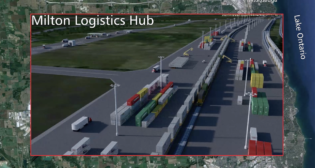
Amidst concerns, optimism for 2017
Written by Frank N. Wilner, Capitol Hill Contributing EditorWhen Herbert Hoover was President and Republicans controlled the White House and both congressional chambers, there was produced the 1930 Smoot-Hawley tariff boosting import duties to record levels, sparking a global trade war and contributing to the depth and length of the Great Depression.
Welcome 2017, when Republicans again control the executive and legislative branches and are cozying to President-elect Trump’s retrenchment from globalism.
U.S. railroads can ill-afford a collapse in world trade—already weakening for two years—on top of coal’s decline owing to generation plant retirements, low natural gas prices and environmental regulations (whose scrapping will not counter adverse market economics). Dreaded also are foreign buyers shopping elsewhere, should the U.S. withdraw from international climate accords. Even crude oil by rail faces headwinds over safety concerns and more pipelines.
Yet there are reasons for railroad optimism—infrastructure investment, tax reform, regulatory rollbacks and a defanging of labor by the Trump Administration.
Amtrak, however—but not private sector entrants to the passenger market—is the cooked holiday goose and may be sold to Yankee Candle Co. for a new fragrance, Burned Money. Why? Consider two Trump transportation team advisers—Shirley Ybarra, formerly associated with the libertarian Reason Foundation, which characterizes Amtrak as “a failed national experiment”; and retired Heritage Foundation economist Ron Utt, among whose favorite piñatas was Amtrak public subsidies.
Ybarra is warm to the concept of private-sector competition on Amtrak state-supported and long-distance routes. There also is emerging bipartisan interest in AIRNet-21’s bid to lease, maintain, renew and dispatch, through a public-private partnership, the North¬east Corridor, while opening it to competition by private-sector operators.
Congressional leadership should remain unaltered. However, Chuck Schumer (D-N.Y.) succeeds retiring Harry Reid (D-Nev.) as Senate Minority Leader—significant because Schumer and Trump, different in so many ways, notwithstanding both being New Yorkers, are conjoined in support of increased infrastructure spending.
Improbable as that relationship seems, history records that two other improbably linked politicos, former House Transportation & Infrastructure Committee Chairman Bud Shuster (R-Pa.), the current chairman’s father, and the then-senior committee Democrat, the late Jim Oberstar (D-Minn.), found just such middle ground in crafting multimodal transportation bills.
Additionally, House Majority Leader Kevin McCarthy (R-Calif.) favors infrastructure spending that Republicans rejected with Obama in the White House—the difference being a Republican linkage to tax reform and tax credits. Expect Democrats, out of political necessity, to climb aboard with Schumer in the lead.
While most railroads pay considerably lower effective tax rates than the 35% statutory rate, tax reform is an agenda item that could spawn new public-private partnerships to double- or triple-track main lines, accelerate short line capital spending and construct improved highways linking ports and expanded rail intermodal terminals.
Most crucial to railroads are regulatory decisions of the five-member Surface Transportation Board, where Trump will name a permanent Republican chairman and nominate at least two new Republicans to unfilled seats created by the 2015 STB Reauthorization Act.
With Norfolk Southern Vice President Robert Martinez on the Trump transportation transition team advising on STB nominees, railroads are in the catbird seat, suggesting the captive shipper agenda has gone from improbable to impossible. The Republican majority will decide on captive shipper petitions for open access, and if to revise the Stand Alone Cost (SAC) test and the formula for determining revenue adequacy.
Expect a new Federal Railroad Administrator with a solid rail safety background, supportive of public-private partnerships, less demanding on installation of Positive Train Control, skeptical of electronically controlled pneumatic (ECP) brakes, and open to one-person train crews.
At the National Mediation Board, the terms of the two Democrats and one Republican have expired. Republican Nicolas Geale, who previously worked with Republican Labor Secretary (and Trump DOT Secretary nominee) Elaine Chao, wife of Senate Majority Leader Mitch McConnell (R-Ky.), is ripe for a bump-up elsewhere, allowing Trump (with airline and railroad input) to name two new Republicans and a new Democrat. Rail labor, engaged in national wage negotiations, should fear a Trump-named Presidential Emergency Board should contract talks break down.



